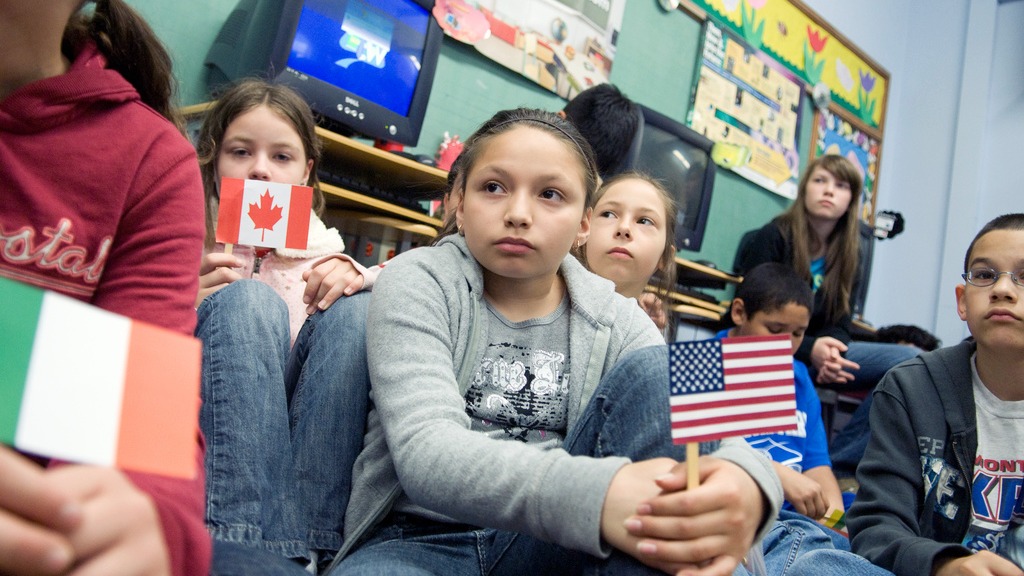My daughter’s fourth-grade class recently spent several weeks researching its family histories. Each student chose one country from their background for a “heritage project,” and then presented what they learned at a lunch where many parents brought their culture’s food to share.
This is a great project…for those of us who have straightforward “heritages” and plenty of information about our family history. My husband’s and my families came here from northern Europe, and my daughter enjoyed learning about our histories. A heritage project is a far more complicated assignment, though, for kids with little knowledge of their ancestry. That includes some who have been adopted as well as many black Americans, a large proportion of whom do not know their families’ origins before they were trafficked and enslaved.
In this country, our heritages are not all created equal.
At the heritage lunch, several black students shared research on states rather than countries, presenting posters on Michigan and California, for instance. I wondered, had they been given the option to select an African country like the Ivory Coast or Ghana, even if they did not know their origins for sure? I also worried about how my daughter and the rest of her class would view these projects. Without any clarification, they could assume some kids researched states instead of countries by mistake. If the teachers had not discussed the issue with the class, these students had been made to look like they had done the assignment wrong, albeit unintentially. And beyond that confusion, silently grouping all these “heritage projects” together skips over the opportunity to educate students about our country’s checkered past—and the legacy it leaves today.
Our collective American heritage is neither simple nor neat. White people like me can easily forget this. In my daughter’s class, it was possible that the ancestors the white students researched and celebrated were among those who ripped the black students’ ancestors from their homelands. This is a hard truth, but one that black American kids know well, even as young as 8 and 9. We need to help all the others grapple with it, too.
I followed up with my daughter’s teacher, sending what I hoped was a polite email. I thanked her for assigning the project and then asked how those who did not know their histories had been directed and whether the difference in projects had been explained to everyone else. Sure enough, she recognized the complexity of assigning this kind of research when students across backgrounds have varying levels of knowledge and help at home. She assured me that the students who chose states were very excited about their reports and that each one felt a connection to the state they chose. I followed up to suggest the entire class could have benefitted from considering the experience many black students have in this type of assignment and the historical reasons for that. The following week, I was encouraged to hear from my daughter that the class discussed forced migration and black heritage in the US at length before their field trip to the African American History Museum.
These tensions I noticed in my daughter’s class come up in schools across the country—and not just during Black History Month. When I wrote about this project on my blog, a reader commented, describing how uncomfortable she had been as a black parent when her child’s elementary school held an “international dinner” and she was expected to bring a dish from their family heritage. What could she make to share alongside the Swedish meatballs and Chinese dumplings? Because she did not want her son to feel left out, she cooked a Southern dish from her roots in Tennessee. They felt enough discomfort over the annual event that they never attended again. She commented that black parents face events like this year after year, and they often choose to suffer in silence, feeling the need to prioritize other issues instead.
There is deep brokenness in our history, and that means that these kinds of issues arise in community events and classrooms, all the time—even when organizers are well-intentioned and hope to honor all backgrounds. Even a thought experiment like, “Which time period do you wish you could travel back to?” can assume a position of privilege and whiteness. For most people of color, traveling back in time would mean visiting a society where their status was far worse and their rights fewer.
The task of advocating for sensitivity and awareness cannot rest solely on the shoulders of people of color.
For white parents, it can be tempting to perpetually sanitize American history, in a misguided attempt to spare children difficult facts. Curriculum writers face a similar temptation; a textbook used in Texas classrooms faced criticism last year when a parent noticed that a chapter on immigration referred to some Europeans coming to America as “indentured servants,” but described Africans as “workers,” not slaves.
I believe it falls to all of us, especially as Christians, to advocate for honest discussions of American history, in our children’s classrooms and elsewhere. We need to help each other do that. The task of keeping us honest, of talking openly about race, of advocating for sensitivity and awareness cannot rest solely on the shoulders of people of color. These are issues of justice and truth. It’s our shared history, after all. Our society’s future depends on how well we teach the past and acknowledge the reality of the present.
Laura Goetsch blogs at Thinking About Such Things, hunting down wisdom and humor with equal ferocity. She is a thinker, laugher, and networker who loves clotheslines, public schools, and the Midwest.









